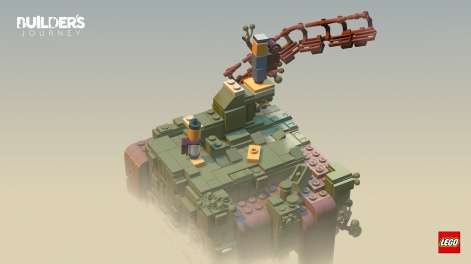The process in creating a game is a difficult, long and often stressful process, but it's one that can reap many awards alongside actually seeing your ideas come to life.
No matter the size of the game or how long it ultimately took to make, each new title involves a lot of hard work, hard decisions, and a little bit of luck before it even gets out the door and onto devices. And in the current mobile market, that's only the first step in having a successful game.
To highlight all of the hard work that often goes on unseen in the background, PocketGamer.biz is reaching out to developers to learn more about the general rigmarole of releasing a video game, with our 'Making Of' series.
This week we spoke with LEGO subsidiary Light Brick Studios creative director and head Karsten Lund about the development of Apple Arcade exclusive LEGO Builder’s Journey.
PocketGamer.biz: Where did the initial idea for the game come from?
Karsten Lund: The idea for the game was to try and turn brick building into a puzzle game mechanic, both to fit the more thoughtful and challenging side of the play material, but also to leverage the satisfaction of clicking bricks that fit into place.
On top of that, the vision was a tribute to more artistic games that subtly convey a poetic story without words and leave the audience with something to think about. We believe that LEGO bricks are an artistic medium that can be used to convey emotion and tell stories, regardless of platform.
"The challenge was to keep the game fresh, challenging and understandable all the way through"Karsten Lund
How long did development take, and how many people worked on the game?
We spent almost two years from early conception to final release with a slowly growing team, to the nine people we are today, plus huge support from LEGO Games colleagues as well.
What was the biggest challenge you had to overcome during development?
The non-verbal style did present some challenges. We went through a lot of iterations until we had a first-time user experience that most players understood and enjoyed. We ended up adding a few written guides just at the beginning to help players navigate and it worked out beautifully.
At what stage in development did you feel you had a game that you were happy with?
We felt we were on to something very early in the process. The challenge was to keep the game fresh, challenging and understandable all the way through. We had a lot of different mechanics to play with, and only a subset of these made the cut.

Was the game soft launched? If so, what did you learn from the soft launch period, and what were the biggest changes you enacted as a result?
We did not soft launch but we tested in-house almost every week of the development process. We kept changing the experience until most players had a fluid and rewarding experience from playing through the game. We went from a more challenging and plot-driven storyline to a more meditative and poetic experience during the development, part of that shift was made because of what we saw in tests.
How happy are you with the game's launch so far?
We went from a more challenging and plot-driven storyline to a more meditative and poetic experience during the developmentKarsten Lund
We've received an overwhelming amount of great reviews from players, who really enjoy this type of LEGO play. It's great to hear the audience ask for more of this. It feels like we're on to something that needs exploring further.
We're very happy with the responses, people are building real life models of game scenes and reflecting on the narrative and how it relates to their own 'play-life', it's heartwarming to read. Of course, you can't please everyone, and there are players who do not connect to the nonverbal, no-tutorial style of the game, and that's perfectly OK.
How are you approaching live ops? What can you tell us about your plans in terms of updates?
We're listening to players and updating the game to address some of the glitches found while updating and solidifying controls. We plan to drop more content with proven mechanics but also planning to deliver new experiences already this year.
How do you see the future of play, with children these days spending all their time on digital devices?
Is there a place for the LEGO brick at all? Absolutely. The LEGO System in Play remains hugely popular with millions of children around the world and the brick has proven its timeless appeal through the past 60 years. We see digital development as an opportunity, not a threat.
We work every day to bring LEGO play in the hands of even more children, and we do that through innovating from the core product, the brick – and also by blending the physical toy and digital features when they can add extra dimensions to the experience.
How do you see yourself fit as a company competing with so many other companies who are experts on the digital field?
We have decades of experience in mixing the best of both worlds. The key example being LEGO Mindstorms which just celebrated its 20th anniversary this year.
We spend every day talking to children all over the world, understanding how to create products they love and that they learn and develop from. So not only do we see ourselves fit in this space, we feel that we have the ideal platform and experience to blend the best of digital and physical play.
What can you tell us about your future mobile projects?
We're hard at work on making new and interesting building experiences, I can't really talk about what they are yet, but you can definitely expect more from Light Brick Studios.





















